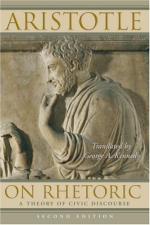
|
| Name: _________________________ | Period: ___________________ |
This quiz consists of 5 multiple choice and 5 short answer questions through Book II, Chapters 1-11.
Multiple Choice Questions
1. How many different subjects of political oratory did Aristotle discuss in Book I, Chapter 4?
(a) Three.
(b) Five.
(c) Four.
(d) Two.
2. From the information in Book II, Chapter 1, what should a speaker do in order to put the audience in a certain frame of mind?
(a) Compliment them.
(b) Ask them questions.
(c) Challenge them.
(d) Manipulate their emotions.
3. How did Aristotle define democracy in Book 2, Chapter 8?
(a) A representative elected by the majority.
(b) The freedom of its citizens.
(c) Two forms of government.
(d) Three branches of a government.
4. How did Aristotle think rhetoric could be useful in terms of one's beliefs?
(a) Confirmation.
(b) Refinement.
(c) Expansion.
(d) Explanation.
5. Why did Aristotle think the universal law was higher than the special law?
(a) It rarely changes.
(b) It changes for the better.
(c) It never changes.
(d) It always changes.
Short Answer Questions
1. What did Aristotle say was the chief concern of political rhetoric?
2. Which kind of distinction was made by Aristotle between war and peace, and national defense?
3. Which one of the following was an example of national defense provided in Book I, Chapter 4?
4. In comparison to the other appeals, how much did Aristotle think that rhetoric resembled the dialectic in the logical appeal?
5. As explained in Book II, Chapter 4, what type of friends were people most likely to choose?
|
This section contains 294 words (approx. 1 page at 300 words per page) |

|




